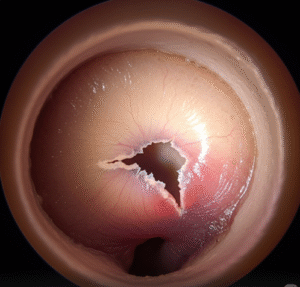Overview
Congenital cytomegalovirus (CMV) is a viral infection that occurs when a baby is infected with CMV before birth. CMV is a common virus, but when transmitted during pregnancy, it can cause serious health problems in the newborn. In Korea, advanced prenatal screening and neonatal care help in early diagnosis and management, reducing long-term complications.
What is Congenital Cytomegalovirus?
Congenital CMV is an infection caused by the cytomegalovirus transmitted from a mother to her unborn baby. The virus can cross the placenta and affect fetal development. While some infants show no symptoms at birth, others may have serious complications.
Symptoms
- Some infants are asymptomatic
- Low birth weight or growth restriction
- Jaundice (yellowing of the skin and eyes)
- Enlarged liver or spleen
- Petechiae (tiny red spots on the skin)
- Microcephaly (small head size)
- Seizures
- Hearing loss (most common long-term complication)
- Vision problems
- Developmental delays
Causes
- Primary CMV infection during pregnancy (most risky)
- Reactivation of previous CMV infection in the mother
- Transmission through the placenta
- Maternal exposure to infected bodily fluids during pregnancy
Risk Factors
- Mother’s first CMV infection during pregnancy
- Frequent exposure to young children (daycare workers, healthcare workers)
- Weakened maternal immune system
- Poor hygiene practices (less common in Korea due to strong healthcare awareness)
Complications
- Permanent hearing loss
- Vision impairment
- Intellectual disability
- Motor and coordination problems
- Seizures and cerebral palsy in severe cases
- Feeding difficulties and failure to thrive
Prevention
- Practicing good hygiene (frequent handwashing, especially after contact with young children)
- Avoiding sharing utensils or food with toddlers
- Using protective measures for pregnant women in high-risk professions
- Prenatal screening and counseling for at-risk mothers (increasingly available in Korea)
Treatment Options in Korea
Korea has well-equipped neonatal and infectious disease facilities to manage congenital CMV:
- Screening and Diagnosis
- PCR testing of urine, saliva, or blood within the first 2–3 weeks after birth
- Prenatal ultrasound and amniotic fluid testing in suspected cases
- Hearing and vision tests for infants at risk
- Medical Treatment
- Antiviral medications (e.g., ganciclovir or valganciclovir) to reduce viral load and prevent complications
- Supportive care for feeding, growth, and neurological support
- Monitoring and Follow-up
- Regular hearing and developmental assessments
- Multidisciplinary care involving pediatric infectious disease specialists, neurologists, and audiologists













